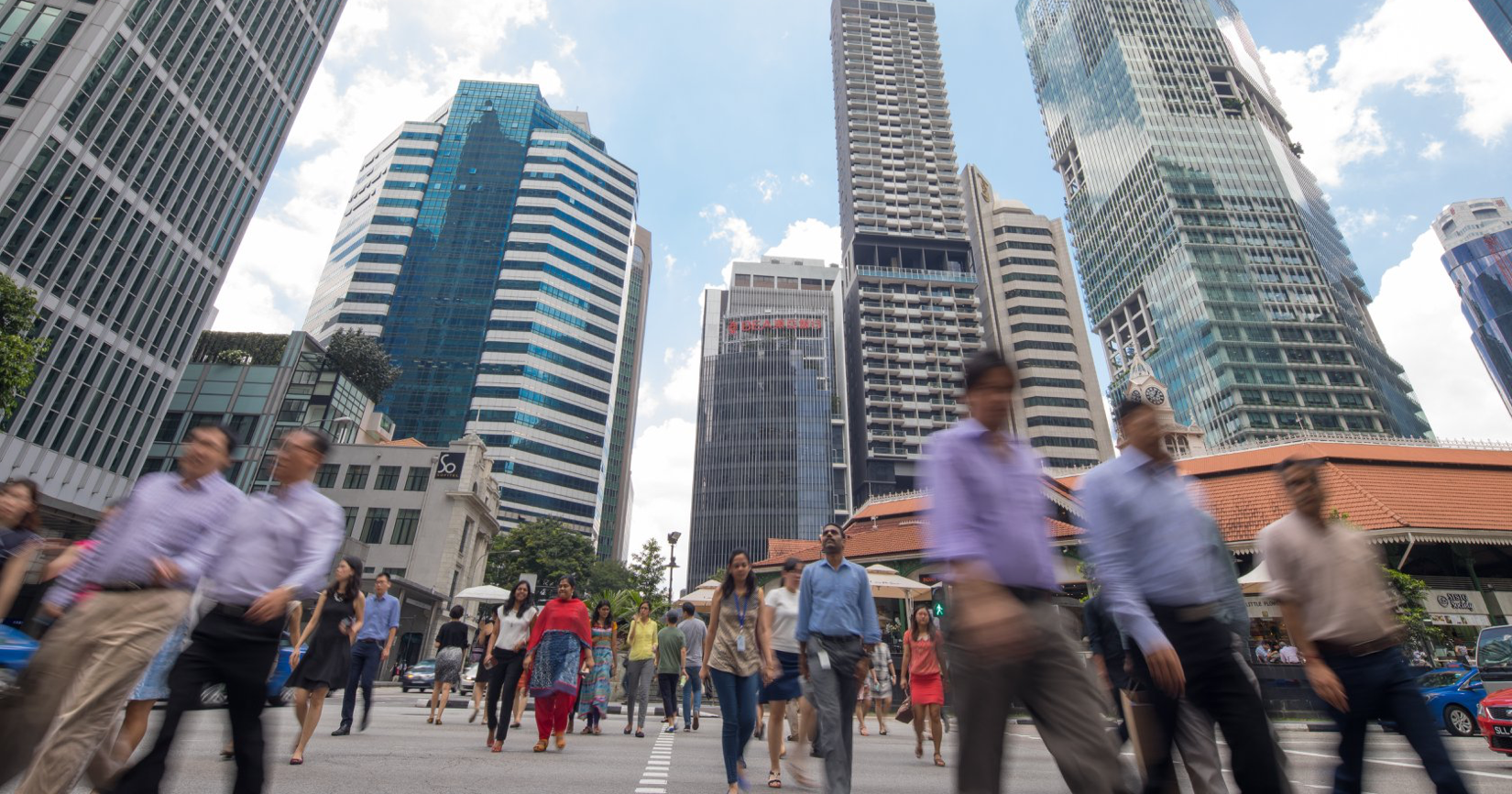Singapore's quest for racial harmony has room for improvement in the workplace.
A recent survey conducted by the Institute of Policy Studies (IPS) found that the experiences of Chinese respondents as compared to those of Malay and Indian respondents in the workplace were significantly different.
Perceived discrimination in the workplace
About 9 percent of minority respondents (coming from Malay, Indian or Other backgrounds) felt that they perceived discrimination at work, often, very often, or all the time.
However, only 2.2 percent of Chinese respondents felt the same way in their workplaces.
IPS wrote:
"Analysing the results by race, we found that, about 9 percent of minorities often, very often or always perceived discrimination at work compared to 2 percent of Chinese respondents (see Table 28). The proportions increased considerably for minorities when we included those who sometimes perceived discrimination.
Around a third of Malays and Indians perceived discrimination at work sometimes, often, or very often or always. Conversely, one in 10 Chinese respondents expressed similar sentiments."
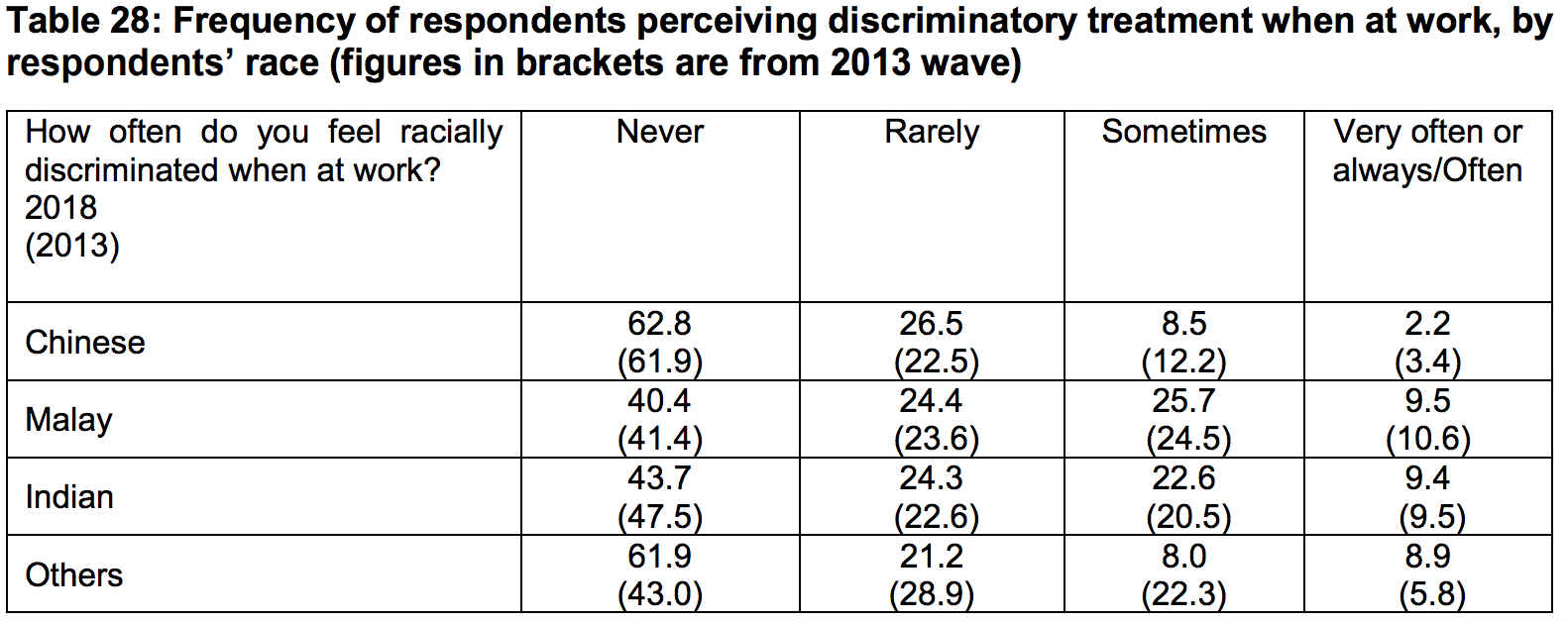 Screenshot from IPS
Screenshot from IPS
IPS noted that the proportions "increased considerably" for minority respondents who "sometimes" perceived discrimination in the workplace.
Some 25.7 percent of Malays and 22.6 percent of Indians felt this, as compared to just 8.5 percent of Chinese respondents.
Promotions
This trend was also reflected when it came to seeking promotions.
Some 18.4 percent of Malays and 19.7 percent of Indians felt that they often, very often or always perceived discrimination.
This rose to 32.4 percent and 25.5 percent respectively when it came to those who "sometimes" perceived discrimination.
For Chinese respondents, only 2.7 percent felt they often or always faced discrimination, rising to 11 percent for "sometimes".
Job-seekers
But what about those trying to get a job in the first place?
Minority respondents also reported perceived discrimination when trying to get their foot in the door.
Significantly, the percentage of those who felt that they often or always faced discrimination when job hunting was much higher than in when trying to get a promotion, or in the workplace in general.
Some 22.3 percent of Malay and 20.8 percent of Indian respondents reported this, as compared to just 2.5 percent of Chinese respondents.
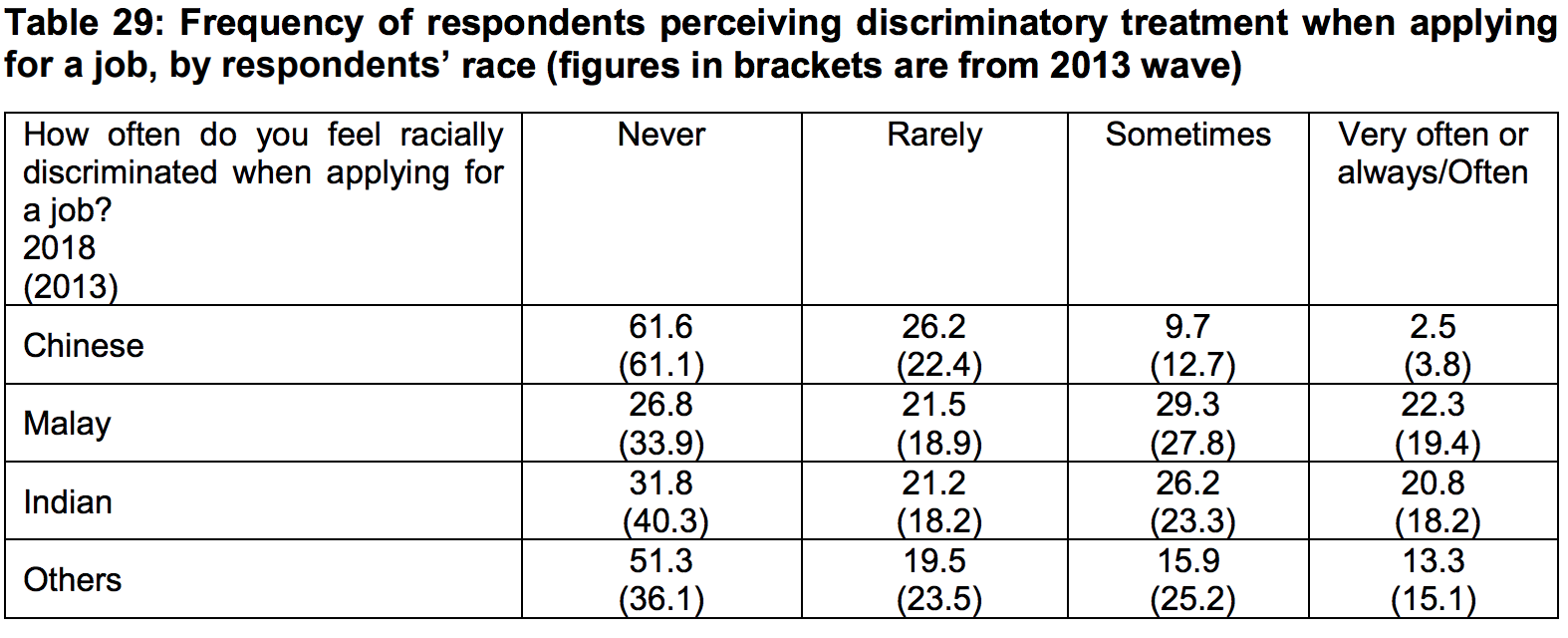 Screenshot from IPS
Screenshot from IPS
Race factor in hiring more important for Chinese respondents
When it came to those making hires, the survey noted that the proportion of Chinese respondents, who felt that race was sometimes an important factor in hiring, was substantially higher than that of Malay and Indian respondents.
Some 34.6 percent Chinese respondents gave such a reply, compared to 21.6 percent of Malay respondents and 15.9 percent of Indian respondents.
When it came to respondents who felt that race was either important most of the time, or always important, 13.1 percent of Chinese respondents agreed.
This was more than 12.8 percent of Malay respondents and 10 percent of Indian respondents.
 Screenshot from IPS
Screenshot from IPS
Perception that Malays and Indians have to work harder than Chinese for a decent life
On the issue of having to work for a decent life, the survey also found that respondents in general felt that Malays and Indians had to work harder compared to Chinese.
In total, 22.4 percent respondents thought this was the case for Malays, and 20.4 percent thought this was the case for Indians, compared to 13.1 percent for Chinese and 10.3 percent for Eurasians.
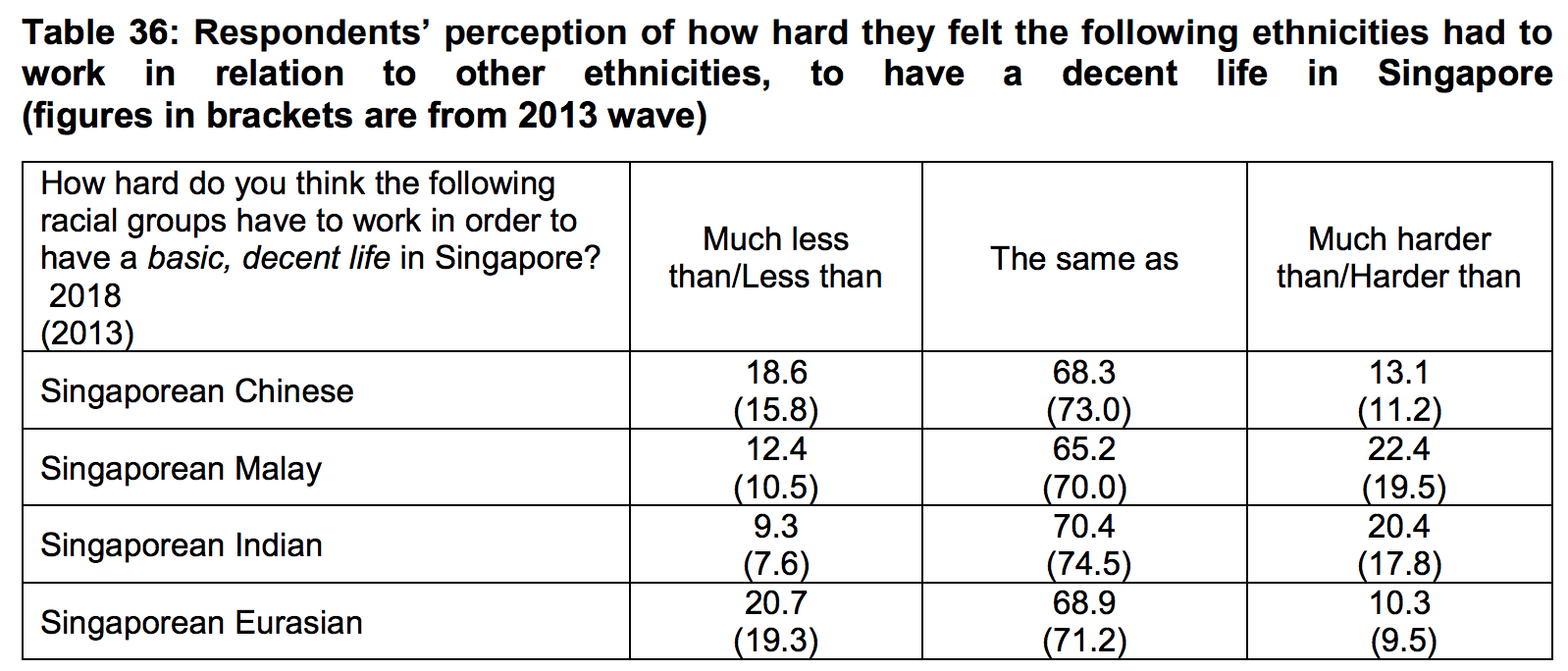 Screenshot from IPS
Screenshot from IPS
Additionally, when the responses were broken down by race, the survey found that more Malay and Indian respondents felt that someone from a minority background had to work harder.
With regard to Malay respondents, 40.6 percent thought that Malays had to work harder than other ethnicity, while 29.8 percent thought that Indians had to work harder.
As for Indian respondents, 36 percent thought that Indians had to work harder than other ethnicity, while 28.7 percent thought that Malays had to work harder.
In comparison, for Chinese respondents, 18.8 percent thought that Malays had to work harder than other ethnicity, while 17 percent thought the same for Indians.
The survey further noted that all of these figures also marked an increase from 2013, with the response of Malay and Indian respondents for their own race registering an increase of 7.4 percent and 7.3 percent respectively.
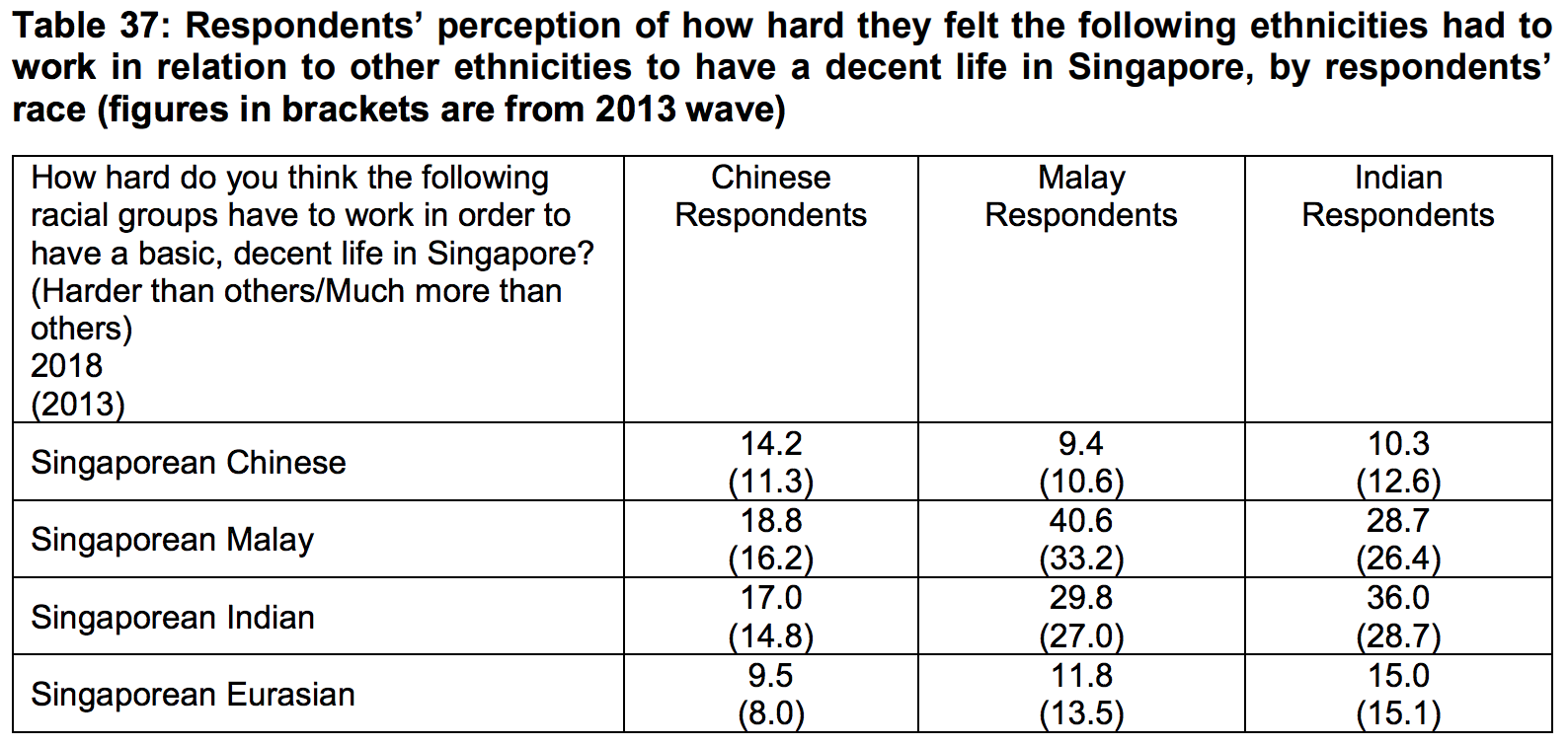 Screenshot from IPS
Screenshot from IPS
If you like what you read, follow us on Facebook, Instagram, Twitter and Telegram to get the latest updates.
